 Petzlover
Petzlover Miniature Schnauzer is originated from Germany but Toy Australian Shepherd is originated from United States. Both Miniature Schnauzer and Toy Australian Shepherd are of same height. Both Miniature Schnauzer and Toy Australian Shepherd are having almost same weight. Both Miniature Schnauzer and Toy Australian Shepherd has almost same life span. Both Miniature Schnauzer and Toy Australian Shepherd has almost same litter size. Both Miniature Schnauzer and Toy Australian Shepherd requires Moderate Maintenance.
Miniature Schnauzer is originated from Germany but Toy Australian Shepherd is originated from United States. Both Miniature Schnauzer and Toy Australian Shepherd are of same height. Both Miniature Schnauzer and Toy Australian Shepherd are having almost same weight. Both Miniature Schnauzer and Toy Australian Shepherd has almost same life span. Both Miniature Schnauzer and Toy Australian Shepherd has almost same litter size. Both Miniature Schnauzer and Toy Australian Shepherd requires Moderate Maintenance.
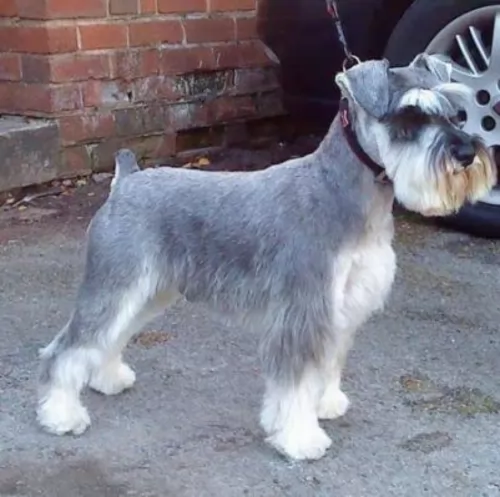 Miniature Schnauzers were first bred in Germany in the 19th century being bred from Affenpinschers and Standard Schnauzers.
Miniature Schnauzers were first bred in Germany in the 19th century being bred from Affenpinschers and Standard Schnauzers.
This dog was always used to control rats on farms, but these days he is more a companion. It is believed that the start of the modern Miniature Schnauzer in the United States was around 1924 when dogs were imported from Germany.
It was in 1933 that the Miniature Schnauzer was recognized by the AKC as a separate breed from the Standard Schnauzer.
 These beautiful little dogs interestingly don’t originate in Australia. They were originally bred in the western U.S. as herding dogs.
These beautiful little dogs interestingly don’t originate in Australia. They were originally bred in the western U.S. as herding dogs.
Today they are mainly companion dogs. Their lineage goes back to a pair of sibling dogs - the Wildhagen Dutchman and Fieldmaster of Flintridge and these two dogs began the lineage to which the Miniature Australian Shepherd belongs.
Known also as ‘Aussie’, there are different stories to its exact origins. It is thought that some Basque farmers brought dogs with them when they came to Australia, taking them to the United States during the 1849 California gold rush.
The dog has been crossed with a number of breeds to bring about a dog that could cope with harsh temperatures.
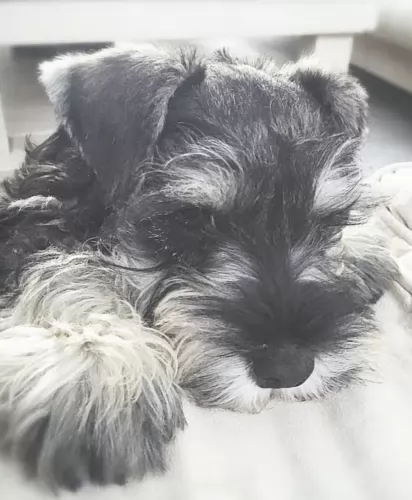 The Miniature Schnauzer is a small dog breed that stands between 30 to 36cm in height and weighs between 5 and 10kg.
The Miniature Schnauzer is a small dog breed that stands between 30 to 36cm in height and weighs between 5 and 10kg.
He has a sturdy body with a dense, wiry coat which most people prefer to have stripped. Because stripping is quite tedious, many of these dog owners prefer to have the coat clipped which actually gives the coat a greyish look to it.
The coat is usually a mix of black and silver. Some people refer to the Miniature Schnauzer as having a salt-and-pepper coat – hairs that are a mix of black and white. The dog has a double coat with the outer coat being wiry and the undercoat being a lot softer.
This is a dog that will need to be groomed frequently to prevent matting. A noticeable feature with these dogs is the rectangular shaped head with alert slanted eyes and bushy eyebrows, mustache and beard. In fact the word ‘Schnauzer’ means beard or muzzle.
The ears have been traditionally cropped but these days they are left and then they tend to be half-erect, half-floppy.
This is a tough little dog, fearless, cheeky, arrogant, alert and also friendly. A draw-card with him is that he is considered as a low-shedder and being hypoallergenic.
They’re very intelligent dogs too and will learn quickly when you give him training and socialization. This is important for a dog like this as he can quickly show you that he is strong willed and independent. Training and socialization makes him much nicer as he becomes more balanced and obedient.
He is full of life and extroverted and you can count on him to join you wherever you are and whatever you’re doing. Whether watching TV, swimming or hiking, he’ll be there and turn every occasion into a festive event. He is a loving, loyal dog, making a splendid pet.
He's protective of his human family and tends to be suspicious of strangers, and this is what makes him such a great watchdog.
 The Toy Australian Shepherd, also referred to as the Mini- or Miniature Australian Shepherd is a small dog standing at between 26 - 36 cm in height and weighing between 3 to 9kg.
The Toy Australian Shepherd, also referred to as the Mini- or Miniature Australian Shepherd is a small dog standing at between 26 - 36 cm in height and weighing between 3 to 9kg.
He has a medium-length, weather-resistant coat which is white with tan, black, red or blue merle. The coat is long, and slightly wavy with feathering around the legs and neck.
They eyes can be blue or brown or he can have two differently colored eyes.The tail of these dogs can be a natural bobtail or it is docked. They do shed but they don’t require that much grooming.
These playful little dogs may be small, but they are brave and full of courage. They’re also easy going, and love nothing more than to be around their human family.
They love the games that children play and are always ready to join in, making excellent playmates for children. Lively and alert, they also make good watchdogs and because they are so intelligent, they are easy to train and socialize.
Their intelligence means they need to be physically and mentally stimulated otherwise they can become destructive from sheer boredom. They’re full of energy and will require regular exercise every day.
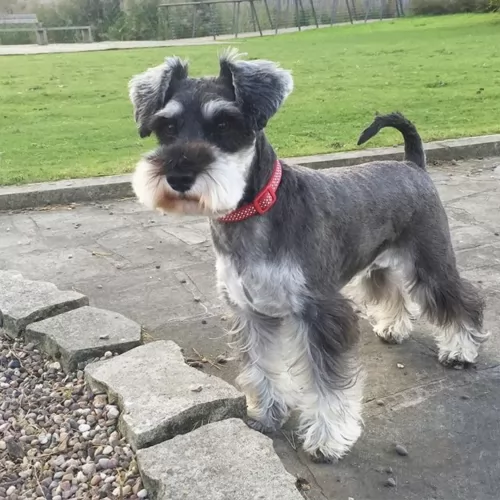 Miniature Schnauzers are such adaptable little dogs, quite happy to make a home with you in the city or in the countryside.
Miniature Schnauzers are such adaptable little dogs, quite happy to make a home with you in the city or in the countryside.
They’re sociable dogs, so just being with his human family wherever they are will suit him well. If he lives in the city however, he will need to have a walk everyday or taken to the park for a run.
He is also a dog that scarcely sheds, so he suits people battling with allergies. With an average life expectancy of 12 to 14 years, if you nurture your Mini Schnauzer and give him the best food and exercise there is, as well as loving him, you’re going to have a loyal and devoted pet.
 The Toy Australian Shepherd is such a clever little dog and eager to learn too. You won’t have trouble getting him trained and socialized as he is eager to learn.
The Toy Australian Shepherd is such a clever little dog and eager to learn too. You won’t have trouble getting him trained and socialized as he is eager to learn.
He bonds closely with his human family, becoming a loyal, devoted pet. They are also great playmates for children. They’re the kind of dogs that will require mental and physical stimulation if they are to to be prevented from becoming bored and frustrated.
They need social interaction with their human family and will be devastated if they were to be stuck in the backyard and all but forgotten.
They have a lifespan of 12 – 14 years and you want to make sure they’re happy, contented years, because he is wiling to play his part and make you a wonderful pet and companion.
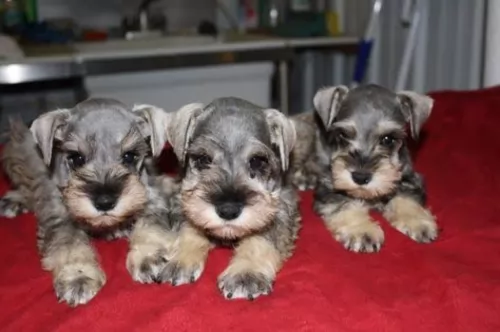 Your Miniature Schnauzer is pretty healthy and he isn’t likely to cost you much in terms of vet fees. There are however some common dog problems that you want to be aware of such as cataracts of the eye and hypothyroidism.
Your Miniature Schnauzer is pretty healthy and he isn’t likely to cost you much in terms of vet fees. There are however some common dog problems that you want to be aware of such as cataracts of the eye and hypothyroidism.
This a a problem in the lens of the eye. The lens should be clear, and when a dog has a cataract, it obscures the vision. The size of the cataract can lead to blindness.
Diabetes in a dog can bring on cataracts as can genetics or damage to the eye from exposure to ultraviolet light. Fortunately, dogs with cataracts can still see. Dogs with old cataracts can have surgery to remove them.
When a dog owner suspects a cataract in their pet’s eye it is best to treat it immediately with anti-inflammatory dog cataract eye drops. Cataracts never go away however without surgery.
The thyroid gland in the neck produces a hormone called thyroxine. It controls metabolism, but with hypothyroidism, enough of the hormone isn’t made. Its a common disease which affects all dog breeds.
Signs of hypothyroidism include hair loss, weight gain, intolerance to cold and a troublesome skin. To have the disease diagnosed, the vet will do a series of blood tests.
 Make sure your Toy Australian Shepherd sees the vet as a puppy to be dewormed and to get his first puppy injections.
Make sure your Toy Australian Shepherd sees the vet as a puppy to be dewormed and to get his first puppy injections.
Dental disease is far more serious than you think. It can affect other areas of your dog’s body. Plaque and inflamed gums lead to bone- and tooth loss.
Bad breath is a sign of periodontal disease. Find out from your vet what to do to guard against periodontitis. It’s important because ignoring bad teeth can lead to heart disease, with bacteria constantly entering the blood stream.
Fleas and ticks are your pet’s enemy as well as heartworm. Dogs can die from heartworm infestations. Heartworm is linked to mosquito bites, so if you live in warm areas, check with your vet for preventative measures.
This is another common dog illness to watch out for. This is a painful condition where the hip joint isn’t formed properly and it can lead to terrible pain and lameness.
Just like people endure endless misery with eczema, dogs too can develop skin allergies. They can create endless frustration and misery for any pet because of the terrible itch and pain. All the licking and scratching can lead to secondary bacterial infections too.
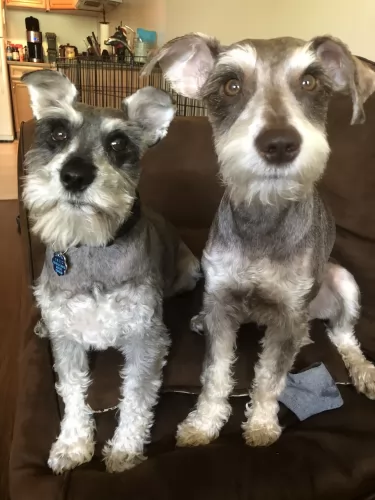 Let’s look at several ways you need to care for your Miniature Schnauzer -
Let’s look at several ways you need to care for your Miniature Schnauzer -
Make sure you have his puppy injections on time. This means knowing which veterinarian you’ll use. Later on if you don’t want to go in for breeding, you will need to have your pet spayed or neutered.
Make sure you have a nice warm, dry spot for your dog to sleep. It can be a cardboard box, or you can buy a dog basket or sleeping platform. Make sure your pet loves it and knows he can retreat to it anytime he wants.
If he goes outside for a few hours, make sure that he has a place to lie in the shade and away from the elements.
Good food promotes good health and longevity. You can feed your pet one of the top quality commercially manufactured foods and give your pet some variety by adding in some boiled chicken, vegetables and brown rice. Some raw meat occasionally can also be excellent for your pet.
 Your puppy will need 4 small bowls of food a day. If you’re wondering just how much, either speak to your vet or follow the portion-guide on the packaging of the puppy dog food.
Your puppy will need 4 small bowls of food a day. If you’re wondering just how much, either speak to your vet or follow the portion-guide on the packaging of the puppy dog food.
As your puppy grows older, you feed less frequently so that he is getting two meals a day as an adult. For feeding an adult, there are excellent commercial dog foods available - remember to choose a good brand for your dogs age, size and energy levels.
Try and give him some tasty home-made food too from time to time – nothing exotic and spicy – just plain foods such as boiled chicken, brown rice, spinach, sweet potatoes and carrots. Dogs thrive on simple, healthy food like this. Make sure he always has a bowl of cool, fresh water to drink.
These energetic little bundles of fur will need regular exercise – every day in fact. He’s a smart little dog too, so you need to provide him with stimulating games that will keep his mind and his body physically fit.
Reduce shedding and loose hair by brushing the long hair a least twice a week. This will also help to get rid of matting. Trim nails and check for fleas and ticks.
Provide your Toy Australian with a warm, dry, peaceful place to sleep. If he is outside often, make sure he has both sun and shade to lie in as well as a sheltered spot for when it rains.